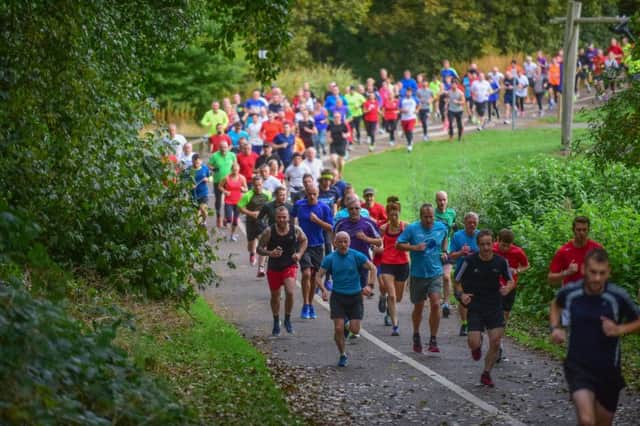Hundreds take part in a Sunderland parkrun at the Silksworth Sports Complex


And if you catch a bus with 40 other people on it, one of them will get out of bed on a Saturday morning to head to Silksworth Sports Complex to take part in the Sunderland parkrun.
The phenomenon is the fastest growing sporting movement in the country.
Advertisement
Hide AdAdvertisement
Hide AdSince it started 13 years ago with 13 runners at Bushy Park, London, parkrun has grown to such an extent that over 1.5 million people have tried it at least once.
And it is not just the running community which fully subscribes.
A survey of almost 2,000 healthcare professionals has revealed the extent to which parkrun is being “prescribed” to patients.
Parkruns are free 5k events with Sunderland’s taking pace at 9am every Saturday throughout the year, and it is co-ordinated entirely by local volunteers.
Advertisement
Hide AdAdvertisement
Hide AdThe healthcare survey aimed to find out if professionals are referring patients to parkrun, an example of “social prescribing”.
For those not referring people to parkrun, the survey also sought to establish what the barriers were.
Almost two-thirds of those surveyed revealed they currently prescribe parkrun in some form.
The online questionnaire attracted responses from a wide range of health specialisms. GPs made up 26% of respondents, with 20% registered nurses and 11% physiotherapists. Occupational therapists, pharmacists and dentists also participated.
Advertisement
Hide AdAdvertisement
Hide AdSocial prescription happens in a relatively informal way, with 91% of practitioners who have signposted to parkrun simply suggesting parkrun to patients and service users.
The analysis revealed a wide range of motivations for prescribing parkrun: 93% do so to help improve the fitness of their patients, 78% to improve mental wellbeing, 62% quality of life, 56% self-confidence, 52% self-care/self-management and 52% to make friends.
Although the majority recommend that people run or walk at parkrun, a third of health care professionals have suggested volunteering, with 17% suggesting patients spectate, possibly with a view to seeing if they would like to participate in future.
Parkrun’s head of health and wellbeing, Chrissie Wellington, said: “We are really encouraged by the scale of the response and the findings of this research.
Advertisement
Hide AdAdvertisement
Hide Ad”It shows a broad awareness amongst a range of healthcare professionals of the health and wellbeing benefits of parkrun that go far beyond physical fitness, and a willingness to refer people to our events as a means of encouraging healthy, active lifestyles and supporting individuals to take greater control of their own health.”
Dr Rangan Chatterjee, from BBC One’s Doctor in the House, said: “At a time when the NHS is under huge pressure, equipping healthcare professionals to prescribe a lifestyle change rather than medicine is extremely important.
“Initiatives such as parkrun are accessible to everyone, free and socially-focused have the potential to help people take their first steps to a healthier and happier lifestyle, and in doing so relieve some strain on our health service.”
Dr Andrew Boyd, Clinical Priority Lead for Physical Activity and Lifestyle at the Royal College of General Practitioners, said: “This survey adds to the evidence base that healthcare professionals are increasingly motivated to get patients to engage in physical activity such as parkrun.
Advertisement
Hide AdAdvertisement
Hide Ad“There is increasing awareness that physical inactivity is a major risk factor for many of the long-term physical and mental health problems GPs and their teams see daily, and parkrun is a fantastic, free and widely available opportunity that is accessible to much of the UK population.
“We encourage primary care teams around the country to find out where their local parkrun is, make contact with them, and consider recommending it to all of their patients; it is the least active in society who will benefit the most from getting involved with parkrun.”
“Chrissie Wellington concluded: “Not only do we now have insight into how and why healthcare professionals recommend parkrun, we also have a much clearer picture of what the barriers might be, and can continue to collaborate with organisations at the national and local level to scale up the social prescribing of parkrun.
“In time we also want to support research that evaluates the outcomes and impact, demonstrating the effectiveness of such interventions on health and wellbeing and informing the development of policy and practice.”